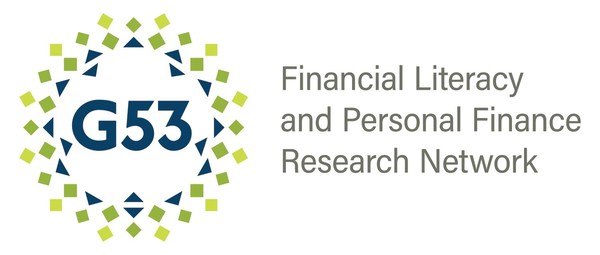 |
New, Global Network to Enhance Study of Financial Literacy and Personal Finance to Help the Hardest Hit by the COVID-19 Pandemic
WASHINGTON, Dec. 9, 2021 /PRNewswire/ -- With families and nations scrambling to hang on during the economic rollercoaster of the COVID-19 pandemic, more than 50 top researchers from around the world are coming together in the G53 Financial Literacy and Personal Finance Research Network. The new group aims to expedite research and solutions that can help people strap on their seatbelts and be better prepared for financial crises, big and small.
"The pandemic has illuminated the pain of financial distress and people need to develop antibodies not just against the virus, but also against financial fragility," said Annamaria Lusardi, co-founder of the new network and University Professor and Academic Director of the George Washington University's Global Financial Literacy Excellence Center (GFLEC), which will house the new G53 Network.
The initiative brings together the best researchers in the field of financial literacy and personal finance to facilitate the exchange of ideas, promote evidence-based research, and inform policy makers and the private sector.
The group refers to itself as the G53 Network in recognition of the academic code – G53 – that represents the field of financial literacy. Fittingly, the network launches with 53 founding members from around the world.
"From changes in demographics to changes in financial markets to the onset of the pandemic, we've seen how critical it is to have basic skills to navigate both expected and unanticipated events," said G53 Network co-chair Panu Kalmi, professor of economics and vice dean at the School of Accounting and Finance at Finland's University of Vaasa. "While policy makers are becoming acutely aware of the consequences of financial illiteracy, there are still many questions to be examined to best understand the benefits of personal finance education, especially to historically underserved populations."
With women and marginalized communities suffering outsized economic impacts from COVID-19 and other issues of our time, expansion of financial literacy is key not just for individuals but also for national and worldwide economic recovery.
"The study of financial literacy has been growing exponentially and its importance has been increasingly recognized over the last decade," Lusardi noted. "By enabling the most rigorous research, we seek to address global challenges in financial literacy and personal finance to influence policy change, the work of the private sector, and to empower people to achieve better life outcomes. In other words, this is research with an impact."
The G53 Network also is committed to building the next generation of researchers by mentoring and training young scholars and graduate students.
Global network members, with more to come, include research fellows and research associates based in Australia, Austria, Belgium, Canada, Finland, Germany, Italy, the Netherlands, Singapore, South Africa, Spain, Sweden, Switzerland, the United Kingdom, and across the United States. Members bring expertise in economics, finance, business, public policy, accountancy, marketing, and law, indicating the wide reach of financial literacy and personal finance research.
A member list and information about the network are available at www.g53network.org and on Twitter and LinkedIn. The G53 Network is powered by GFLEC at the GW School of Business and the Sim Kee Boon Institute for Financial Economics at the Singapore Management University.
MEDIA CONTACT:
Lisa Fels Davitt
+1 973-886-1917
lisa@successioncommunications.com